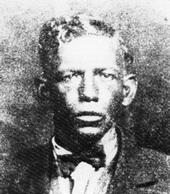Born in April 1891, between Edwards and Bolton in southern Mississippi, Charley Patton was the scrawny child of sharecropper parents. In 1900, his family moved 100 miles north to the Delta and the Will Dockery Plantation. There Patton fell under the spell of guitarist Henry Sloan and would follow him to gigs. By 1910, he had become proficient as a performer and songwriter, having already composed "Down The Dirt Road Blues," a slow drag called "Banty Rooster Blues," and his theme song "Pony Blues."After the turn of the decade Patton began playing with Willie Brown, a guitarist who would later become a regular on his recordings. Patton's music began to exert considerable influence; guitarist Tommy Johnson had moved to the Dockery vicinity circa 1913 and was soon playing Delta blues including Patton's "Pony Blues." Around 1914, Patton began playing his guitar with members of the Chatmon family, working picnics and frolics. Bo, Sam, and Lonnie Chatmon and guitarist Walter Vinson later would gain fame as the Mississippi Sheiks. Bo Chatmon also recorded many titles as soloist Bo Carter. Patton continued playing and rambling around the Delta, going north to Memphis and as far west as Arkansas and Louisiana. By 1926, a young Robert Johnson had begun following Patton and Brown to gigs trying to learn from the veteran guitarists.Patton made his first recording in June 1929, cutting fourteen songs for the Paramount label, all issued on 78s. Such was the success of his initial session that he was invited four months later to Paramount's new studio in Grafton, Wisconsin, where he recorded twenty-eight additional tunes. Patton's polyrhythmic picking, accompanied by tapping the body of the guitar, created an intricate dance melody that its author could play for thirty minutes or more. Son House, who recorded in a 1930 session that also featured Patton and Brown, recalled that Charley "clowned" for an audience by playing the guitar behind his back or between his knees. Patton included regional landmarks in his tunes - places that a local record-buying audience would be familiar with, including a Moorehead, Mississippi railroad crossing, "Where The Southern Crosses The Dog," in "Green River Blues" and Parchman Farm in "A Spoonful Blues."Howlin' Wolf, who moved to Dockery in 1926, recalled seeing Patton on the town square in Drew, not far from Dockery Plantation. Patton's hypnotic three-note songs also deeply influenced Clarksdale's John Lee Hooker, who recorded his own version of Patton's "Pea Vine Blues." Bukka White also cited a desire "to come to be a famous man, like Charley Patton," and demonstrated a similar knack for playing dance songs for extended periods. Patton's last recording session was in New York City in February 1934, two months before his death.Charley Patton died April 28, 1934, at 350 Heathman Street in Indianola, Mississippi. Patton's grave is located in Holly Ridge, Mississippi, and the tombstone acknowledges his pivotal role in the development of the Delta Blues.
